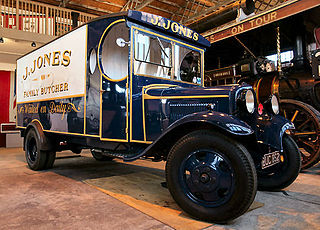"The Deadly Attachment" is the first episode of the sixth series of the British television sitcom Dad's Army. It was originally transmitted on Wednesday, October 31, 1973. It is arguably one of the best-known episodes of the series because of the comic aspects of a rare encounter between the platoon and the Germans. A scene in which a German officer demands to know Private Pike's name, and Captain Mainwaring says, "Don't tell him, Pike!" has been judged as one of the top three greatest comedy moments of British television.

"The Armoured Might of Lance Corporal Jones" is the first episode of the third series of the British comedy series Dad's Army. It was originally transmitted on Thursday 11 September 1969. It is also the first episode to be made in colour, though it was originally broadcast in black and white.
"The Face on the Poster" is the sixth episode of the eighth series of the British comedy series Dad's Army. It was originally transmitted on 10 October 1975.
"Battle of the Giants!" is the first special Christmas episode of the British comedy series Dad's Army. It was originally transmitted on 27 December 1971. The episode was recorded 19 October 1971.
"The Day the Balloon Went Up" is the eighth episode of the third series of the British comedy series Dad's Army that was originally transmitted on Thursday 30 October 1969.
"The Big Parade" is the first episode of the fourth series of the British comedy series Dad's Army. It was originally transmitted on Friday 25 September 1970.
"Don't Forget the Diver" is the second episode of the fourth series of the British comedy series Dad's Army. It was originally transmitted on 2 October 1970.
"The Test" is the tenth episode of the fourth series of the British comedy series Dad's Army. It was originally transmitted on Friday 27 November 1970.
"Uninvited Guests" is the twelfth episode of the fourth series of the British comedy TV series Dad's Army. It was originally transmitted on Friday 11 December 1970.
"We Know Our Onions" is the fourth episode of the sixth series of the British comedy series Dad's Army. It was originally transmitted on 21 November 1973.
"The Honourable Man" is the fifth episode of the sixth series of the British comedy series Dad's Army. It was originally transmitted on 28 November 1973.
"Getting the Bird" is the fourth episode of the fifth series of the British television situation comedy Dad's Army. It was originally transmitted on 27 October 1972.
"Broadcast to the Empire" is the fourth Christmas Night with the Stars sketch of the British television comedy series Dad's Army. It was originally transmitted on Monday 25 December 1972. A full-length radio version was also made, entitled Ten Seconds From Now, which was the last radio episode to be made.
"Everybody's Trucking" is the first episode of the seventh series of the British television sitcom Dad's Army. It was originally transmitted on 15 November 1974.

"All Is Safely Gathered In" is the eighth episode of the fifth series of the British comedy series Dad's Army. It was originally transmitted on 24 November 1972. The episode was a favourite episode of writer David Croft, which he described in an interview with Graham McCann as "a joyous thing".
"When Did You Last See Your Money?" is the ninth episode of the fifth series of the British comedy series Dad's Army. It was originally transmitted on 1 December 1972.
"A Brush with the Law" is the eleventh episode of the fifth series of the British comedy series Dad's Army. It was originally transmitted on 15 December 1972.
"Time on My Hands" is the thirteenth and final episode of the fifth series of the British comedy series Dad's Army. It was originally transmitted on 29 December 1972.
"The Miser's Hoard" is the fourth episode of the ninth and final series of the British comedy series Dad's Army. It was originally transmitted on 23 October 1977.

Dad's Army is a British television sitcom about the United Kingdom's Home Guard during the Second World War. It was written by Jimmy Perry and David Croft, and originally broadcast on BBC1 from 31 July 1968 to 13 November 1977. It ran for nine series and 80 episodes in total; a feature film released in 1971, a stage show and a radio version based on the television scripts were also produced. The series regularly gained audiences of 18 million viewers and is still shown internationally.


